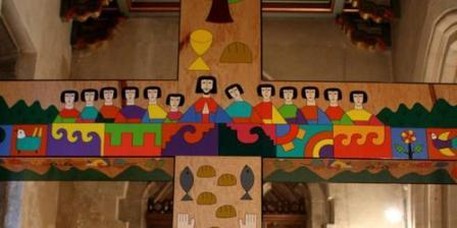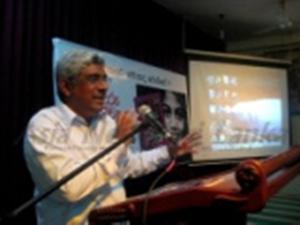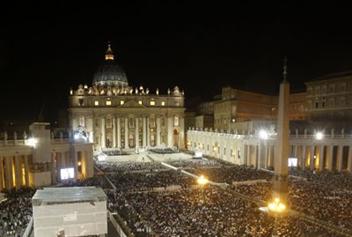Oct 2013 - two - abbey
Main menu:
- Home Page
- Abbey
- Apiary
- Documents
- Monastic
- Spirituality
- Apostleship of the Sea
- Homilies of Pope Francis
Oct 2013 - two
11. Pope says focus on morality can obscure Gospel message
In a lengthy and wide- The interview, conducted in August, was the basis for a 12,000-
The interview, conducted in August, was the basis for a 12,000-
"Proclamation in a missionary style focuses on the essentials, on the necessary things," he said. "We have to find a new balance; otherwise even the moral edifice of the church is likely to fall like a house of cards, losing the freshness and fragrance of the Gospel. "The proposal of the Gospel must be more simple, profound, radiant. It is from this proposition that the moral consequences then flow."
The pope reaffirmed one of his major themes: the need for mercy rather than judgment when approaching sin. "The thing the church needs most today is the ability to heal wounds and to warm the hearts of the faithful. It needs nearness, proximity," he said. "The church sometimes has locked itself up in small things, in small-
Pope Francis also spoke extensively about his approach to church governance. "Many think that changes and reforms can take place in a short time," the pope said. "I believe that we always need time to lay the foundations for real, effective change. And this is the time of discernment. "Sometimes discernment instead urges us to do precisely what you had at first thought you would do later. And that is what happened to me in recent months," he said without specifying any issue.
The pope described the evolution of his governing style, starting with his appointment at age 36 as superior of the Argentine province of the Jesuits. "My authoritarian and quick manner of making decisions led me to have serious problems and to be accused of being ultraconservative," Pope Francis said, adding, "I have never been a right-
With respect to the Vatican bureaucracy, whose reform he has made a clear priority of his six-
Some Vatican offices "run the risk of becoming institutions of censorship," he said. "It is amazing to see the denunciations for lack of orthodoxy that come to Rome. I think the cases should be investigated by the local bishops' conferences, which can get valuable assistance from Rome. These cases, in fact, are much better dealt with locally. The Roman congregations are mediators; they are not middlemen or managers."
In matters of belief rather than governance, Pope Francis said that the pope and bishops share authority with the laity. "The church is the people of God on the journey through history," he said. "Thinking with the church, therefore, is my way of being a part of this people. And all the faithful, considered as a whole, are infallible in matters of belief." The pope quickly added that "we must be very careful not to think that this 'infallibilitas' of all the faithful I am talking about in the light of Vatican II is a form of populism. No; it is the experience of 'holy mother the hierarchical church,' as St. Ignatius called it, the church as the people of God, pastors and people together."
Among the other topics the pope addressed in the interview was the challenge of finding a more visible role for women in a church with an all-
Pope Francis, whose simple way of celebrating Mass has attracted criticism from traditionalist Catholics, also took up the controversial subject of liturgy. Pope Benedict XVI's 2007 decision to lift most restrictions on celebrating the Tridentine Mass was "was prudent and motivated by the desire to help people who have this sensitivity," Pope Francis said. "What is worrying, though, is the risk of the ideologization of the (old Mass), it's exploitation." The pope also said that the liturgical reform that followed in the wake of the 1962-
12. Pope condemns Pakistan church blast as act of hate and war
A pair of suicide bombers blew themselves up amid hundreds of worshippers outside the All Saints Church in the city of Peshawar, injuring over 140. The attack, in which over 140 were also wounded, occurred as worshippers were leaving after services to get a free meal of rice offered on the front lawn. The historic church, dating back to 1883, is a parish of the Church of Pakistan, which is part of the Anglican Communion.
The remarks of Pope Francis came at the end of his talk to young Sardinians where he was encouraging them to forge ahead with Jesus to build, to do good, to go ahead living, to help others and build a better world of peace. “If you don’t do it, no one else will do it,” the Pope said,. He then invited all to join him in praying an ‘Our Father’ for all those killed in the Pakistani attack. The Holy Father also prayed to the Madonna to help all to work for a better world, to take up the path of building up, the path of peace and never the road of destruction and war.
13. Pakistani, Indian Catholic bishops condemn Peshawar church attack
The Catholic bishops of Pakistan have vehemently condemned the September 22, deadly bomb attack at the All Saints Church in Peshawar, in which at least 81persons died and more than 140 have been injured. In a statement, Archbishop Joseph Coutts of Karachi, the president of the Pakistan Catholic Bishops' Conference (PCBC) condemned in the "strongest terms" the ‘shameful and cowardly’ "attack on innocent men, women and children". He expressed sorrow and solidarity for the loss of “so many innocent lives" and their families. As a sign of mourning and protest, the archbishop announced the closure of all Christian educational institutions of Pakistan, September 23 to 25. Archbishop Coutts also calls for "special prayers" for "those who have been martyred and wounded", while launching an appeal to the whole Christian community to "remain calm and avoid violent acts". He appealed to the government of Pakistan to "take all necessary measures to catch the perpetrators," and urgent measures to "protect the places of worship of religious minorities " against attacks that have reached "alarming proportions."
Solidarity and condemnation have been expressed also by other Christian and Muslim leaders . Bishop Rufin Anthony of Islamabad-
Meanwhile, India’s Catholic bishops have joined their counterparts in neighbouring Pakistan in condemning Sunday’s deadly bomb attack at the All Saints Church, Peshawar. “While condemning this dastardly act of violence against a defenceless congregation in worship and prayer, the Catholic Bishops’ Conference of India (CBCI) commends the souls of the dead to the mercy of God and invokes Divine assistance on those hundreds of suffering Christians, consequent on the bomb blast,” wrote CBCI Secretary General, Archbishop Albert D’Souza of Agra in a statement. He expressed concern that in the recent past, Christians have been targeted and attacked by one or other fundamentalist groups, for no fault of theirs, and sometimes for reasons, totally false and fabricated. India’s Catholic Bishops fully endorsed the statement of Pakistani Prime Minister Nawaz Sharif who said that ‘targeting innocent people is against the teachings of Islam and that such cruel acts reflect the brutality and inhumane mind-
14. Church grateful to UN for International Day of Charity in memory of Mother Teresa
“The Catholic Church is grateful that an International Day of Charity is introduced for the first time into the calendar of the United Nations in memory of Mother Teresa of Calcutta. Honouring her person, life and legacy also means recognizing the innumerable charitable works the Catholic Church carries out daily in favour of the poorest of the poor, ever faithful to the commandment and example of her Founder.
The Holy See’s Permanent Observer to the United Nations in New York, Indian Archbishop Francis Chullikatt made the statement in a press release on Thursday, as the UN marked its first International Day of Charity on the 16th death anniversary of saintly nun who died on Sept. 5, 1997. Instituted by the UN last December, the day was marked with a special event in New York on Thursday September 5.
Explaining the Christian notion of charity, Archbishop Chullikatt said, “We are proud to commemorate this day as an act of recognition and esteem on the part of the international community for the service and dedication of countless individuals, Catholic organizations and religious men and women, who like Blessed Mother Teresa, have brought the light of their selfless love to those in need.” The prelate noted that the Catholic Church is the world’s largest non-
UN Secretary General Ban ki-
15. Archbishop Oscar Romero honoured in London Cathedral
Commissioned by the Archbishop Romero Trust especially for St George’s Cathedral, the Cross contains a fragment of the alb that Romero was wearing on the day of his assassination. It stands alongside a bust of the Salvadoran archbishop, who was gunned down while celebrating Mass on 24 March 1980.
On Thursday, at an ecumenical service presided over by Archbishop Peter Smith, Archbishop Romero’s life and legacy was recalled. Julian Filochowski, chair of the Archbishop Romero Trust and former director of the Catholic aid and development agency CAFOD, while speaking to Vatican Radio’s Philippa Hitchen said about the importance of the Romero memorial and his hopes for a speedy beatification of the martyred Salvadoran archbishop.
He said: "The Romero Trust had been given a precious fragment of the bloodstained alb of Archbishop Romero that he was wearing at the time of his assassination......really in thanksgiving from the Church in San Salvador for the work we'd done over many years in renovating Romero's little house and conserving his belongings, in particular the clothing he was wearing at the time of his killing....so we wanted it to be in a place where people could come, a focus for prayer and for those concerned with justice, with an option for the poor in the lines of Archbishop Romero.
It's to honour Archbishop Romero who is on the road to sainthood, but it's also dedicated to the memory of Bishop Michael Evans who was a great Romero 'fan', he had Romero as a model for his Episcopal ministry in the diocese of East Anglia and he was the first to make a donation towards the commissioning of the Cross....
The thing with Romero was that he not only expressed and spoke his faith but he lived the faith....his commitment to the poor took him to his death....and here in St George's Cathedral, we'll hopefully have this Romero space which will become a focus for prayer and other services when Romero's cause if finally recognised...

16. Catholicos of the Malankara Orthodox Syrian Church meets with Pope
Moran Baselios Marthoma Paulose II, Catholicos of the Malankara Orthodox Syrian Church in India, visited Pope Francis Thursday September 5. The meeting formed part of the Catholicos' pastoral visit to orthodox faithful in Europe.
The Malankara Orthodox Church is divided into two communities: the Malankara Orthodox Syrian Church in full communion with the Orthodox Syrian Patriarch of Antioch, and the Malankara Orthodox Syrian Church led by His Holiness Moran Baselios Marthoma Paulose II, (automous orthodox Church). The Orthodox Syrian Church currently has over 2.5 million members in thirty dioceses, with more than 33 bishops and 1,700 priests.
Two important meetings took place between Pope John Paul II and the Catholicos Moran Mar Baselios Marthoma Mathews I, in Rome in 1983 and in Kottayam in 1986; on the latter occasion the Mixed International Commission for Dialogue between the Catholic Church and the Malankara Orthodox Syrian Church was established. In 1990, the common Christological Declaration was signed. Since 1989 two parallel dialogues have taken place annually in Kerala, southern India; one with each of the two communities. These dialogues relate to questions on three main themes: the history of the Church in India, ecclesiology, and common witness.
The Catholicos Moran Baselios Marthoma Paulose II, after meeting with the Holy Father visited the tomb of the Apostle Peter and was received by the Pontifical Council for the Promotion of Christian unity.
In his address, pope Francis, referring to the faith of St. Thomas, said “It is precisely in this faith that we meet each other; it is this faith that unites us, even if we cannot yet share the Eucharistic table; and it is this faith which urges us to continue and intensify the commitment to ecumenism, encounter and dialogue towards full communion. He said, “With you I desire that our Churches may soon find effective ways of resolving the urgent pastoral problems that face us, and that we may progress together in brotherly love and in our theological dialogue, for it is by these means that reconciliation among Christians and reconciliation in the world can come about.” He added.
17. Pontifical Council discusses future of marriage, family
In the third week of September the Pontifical Council for the Family held a conference to discuss how to recover the true meaning of the family in the context of a growing process of deconstructionism and confusion.
“The family is still regarded almost universally as a good,” said Cardinal Francesco Coccopalmerio, president of the Pontifical Council for Legislative Texts, Sept. 19, at a press meet preceding the conference, while adding that in secular society “there are still all the pieces of marriage, but not the whole building anymore. Marriage has not been destroyed by a bomb, but it has been deconstructed, so that we recognize the pieces but we cannot recognize the building anymore.”
The contemporary challenge, he said, “is to speak about the truth of marriage to non-
The conference, held at the Pontifical Urban University in Rome, ran Sept. 19-
Among the topics that were discussed in group sessions included the role of women in and for the family; work, family and economic challenges; procreation and the challenges of biotechnology; and the family in the experience of immigration.
18. Buddhist scholar says Christianity has brightened his life Noting that that the world today is full of dangerous and evil things," Prof Abeysundara said modern media often seek to exploit and destroy the lives of young people. Internet, Facebook, text messages, e-
Noting that that the world today is full of dangerous and evil things," Prof Abeysundara said modern media often seek to exploit and destroy the lives of young people. Internet, Facebook, text messages, e-
19. Death penalty for misuse of blasphemy law
At a meeting in Islamabad in the third week of September, the council said misuse of blasphemy laws is as blasphemous and punishable as the act itself. Those who abuse the law should also be punished with the death penalty, it said. Blasphemy is a highly sensitive issue in Pakistan, which has effectively claimed the lives of Salman Taseer and Shahbaz Bhatti after the two politicians spoke out and called for the law to be reformed. Asia Bibi, a Christian mother of four, has been in jail for the past four years on blasphemy charges, having drunk water from a cup that was reserved for Muslim women.
Rimsha Masih, a 14-
"I thank Allah that I attained a most significant victory in the CII meeting which approved the death sentence for those who file an untrue [accusation] of some blasphemous incident," he said after the meeting. "I dedicate this effort to all those including Salman Taseer and Shahbaz Bhatti, who have fought for righteousness," he added. The All Pakistan Minorities Alliance (APMA), an umbrella organization representing minorities and marginalized communities, hailed the CII recommendation as “a positive step forward. We have been engaged in a long struggle towards this very end to stop misuse of the blasphemy law; hence, it is definitely a good development,” said APMA chairman Doctor Paul Bhatti, Shahbaz Bhatti's elder brother.
The APMA made this very same demand at its national conference in February this year to end this abuse of the law, he added.
20. Millions join Pope Francis in support of Peace
Millions of people throughout the world responded to Pope Francis' call for a day of prayer and fasting on Saturday September 7, for peace in Syria and around the world. An estimated 100,000 people converged in front of St. Peter’s basilica in Rome in support of Pope’s appeal for peace.
Addressing them, Pope Francis said that our world, in the heart and mind of God, is the “house of harmony and peace”, and that it is the space in which everyone is able to find their proper place and feel at home, because God saw it was “good”. All of creation forms a harmonious and good unity, but above all humanity, made in the image and likeness of God, is one family, in which relationships are marked by a true fraternity.
Pope's Homily during the vigil is given below
“And God saw that it was good” (Gen 1:12, 18, 21, 25). The biblical account of the beginning of the history of the world and of humanity speaks to us of a God who looks at creation, in a sense contemplating it, and declares: “It is good”. This allows us to enter into God’s heart and, precisely from within him, to receive his message.
We can ask ourselves: what does this message mean? What does it say to me, to you, to all of us?
1. It says to us simply that this, our world, in the heart and mind of God, is the “house of harmony and peace”, and that it is the space in which everyone is able to find their proper place and feel “at home”, because it is “good”. All of creation forms a harmonious and good unity, but above all humanity, made in the image and likeness of God, is one family, in which relationships are marked by a true fraternity not only in words: the other person is a brother or sister to love, and our relationship with God, who is love, fidelity and goodness, mirrors every human relationship and brings harmony to the whole of creation. God’s world is a world where everyone feels responsible for the other, for the good of the other. This evening, in reflection, fasting and prayer, each of us deep down should ask ourselves: Is this really the world that I desire? Is this really the world that we all carry in our hearts? Is the world that we want really a world of harmony and peace, in ourselves, in our relations with others, in families, in cities, in and between nations? And does not true freedom mean choosing ways in this world that lead to the good of all and are guided by love?
 2. But then we wonder: Is this the world in which we are living? Creation retains its beauty which fills us with awe and it remains a good work. But there is also “violence, division, disagreement, war”. This occurs when man, the summit of creation, stops contemplating beauty and goodness, and withdraws into his own selfishness.
2. But then we wonder: Is this the world in which we are living? Creation retains its beauty which fills us with awe and it remains a good work. But there is also “violence, division, disagreement, war”. This occurs when man, the summit of creation, stops contemplating beauty and goodness, and withdraws into his own selfishness.
When man thinks only of himself, of his own interests and places himself in the centre, when he permits himself to be captivated by the idols of dominion and power, when he puts himself in God’s place, then all relationships are broken and everything is ruined; then the door opens to violence, indifference, and conflict. This is precisely what the passage in the Book of Genesis seeks to teach us in the story of the Fall: man enters into conflict with himself, he realizes that he is naked and he hides himself because he is afraid (cf. Gen 3: 10), he is afraid of God’s glance; he accuses the woman, she who is flesh of his flesh (cf. v. 12); he breaks harmony with creation, he begins to raise his hand against his brother to kill him. Can we say that from harmony he passes to “disharmony”? No, there is no such thing as “disharmony”; there is either harmony or we fall into chaos, where there is violence, argument, conflict, fear ....
It is exactly in this chaos that God asks man’s conscience: “Where is Abel your brother?” and Cain responds: “I do not know; am I my brother’s keeper?” (Gen 4:9). We too are asked this question, it would be good for us to ask ourselves as well: Am I really my brother’s keeper? Yes, you are your brother’s keeper! To be human means to care for one another! But when harmony is broken, a metamorphosis occurs: the brother who is to be cared for and loved becomes an adversary to fight, to kill. What violence occurs at that moment, how many conflicts, how many wars have marked our history! We need only look at the suffering of so many brothers and sisters. This is not a question of coincidence, but the truth: we bring about the rebirth of Cain in every act of violence and in every war. All of us! And even today we continue this history of conflict between brothers, even today we raise our hands against our brother. Even today, we let ourselves be guided by idols, by selfishness, by our own interests, and this attitude persists. We have perfected our weapons, our conscience has fallen asleep, and we have sharpened our ideas to justify ourselves. As if it were normal, we continue to sow destruction, pain, death! Violence and war lead only to death, they speak of death! Violence and war are the language of death!
3. At this point I ask myself: Is it possible to change direction? Can we get out of this spiral of sorrow and death? Can we learn once again to walk and live in the ways of peace? Invoking the help of God, under the maternal gaze of the Salus Populi Romani, Queen of Peace, I say: Yes, it is possible for everyone! From every corner of the world tonight, I would like to hear us cry out: Yes, it is possible for everyone! Or even better, I would like for each one of us, from the least to the greatest, including those called to govern nations, to respond: Yes, we want it! My Christian faith urges me to look to the Cross. How I wish that all men and women of good will would look to the Cross if only for a moment! There, we can see God’s reply: violence is not answered with violence, death is not answered with the language of death.
In the silence of the Cross, the uproar of weapons ceases and the language of reconciliation, forgiveness, dialogue, and peace is spoken. This evening, I ask the Lord that we Christians, and our brothers and sisters of other religions, and every man and woman of good will, cry out forcefully: violence and war are never the way to peace! Let everyone be moved to look into the depths of his or her conscience and listen to that word which says: Leave behind the self-
Pope Francis thanked the participants of the prayer vigil held on Saturday. In a twitter message published on Tuesday September 10, the Pontiff wrote: I thank everyone who participated in the prayer vigil and the fast for peace.